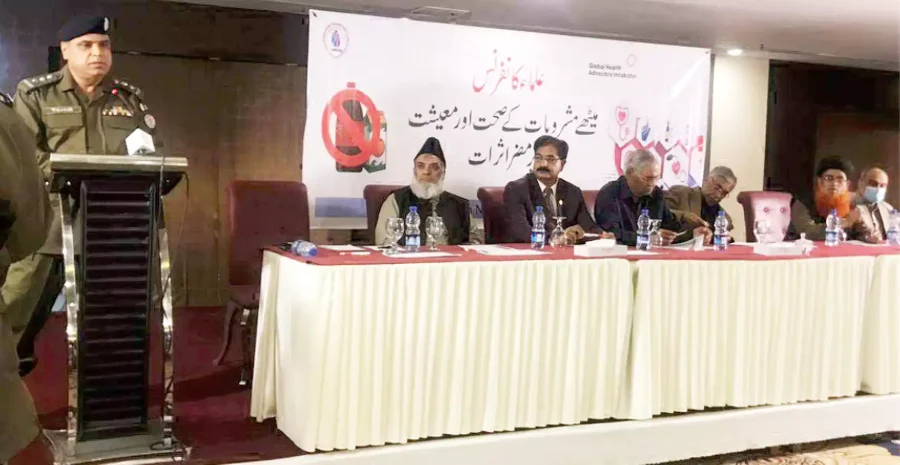The growing burden of the diet related to non-communicable diseases is haunting the development of Pakistan and the religious leaders of the country should play their role in raising awareness among the public on the harmful effects of sugary drinks during Ramazan and beyond. These views were expressed during an Ulema conference organized by the Pakistan National Heart Association (PANAH) at local hotel in Islamabad.
The conference was attended by a large number of Ulema, civil society representatives, health professionals and journalists. Maj Gen (R ) Masud ur Rehman Kiani, Munawar Hussain, Consultant Food Policy Program at Global Health Advocacy Incubator, Dr. Khawaja Masuood Ahmed from Ministry of Health, Dr Tanveer Ibrahim from National Institute of Health, Mr Tahir Sikandar DSP, Dr. Fayyaz Ahmad Ranjha, Executive vice President PANAH Dr Abdul Qayyum Awan, civil society representatives, health professionals and journalists participated in the event. “Unhealthy diet is the top reason for diseases and deaths in Pakistan. People are dying every minute due to diabetes, heart diseases, cancers and other chronic diseases. These precious lives could be saved by adopting healthier choices in the diet” said by Maj. Gen. (R) Masud ur Rehman Kiani while speaking on this occasion. “Ulema have great respect in Pakistani society and people listen to them more than anyone else. Sugary drinks are among the major contributors to these diseases. “Ulema should help raise awareness among the public of the health harms of sugary drinks and other unhealthy food choices during Jumma prayers and community gatherings” he added.
Munawar Hussain Consultant Food Policy Program at Global Health Advocacy Incubator while referring to International Diabetes Federation’s Atlas said “Pakistan is ranked 3rd highest globally with 33 million people living with diabetes in 2021. If no policy action is taken immediately, the number of people living with diabetes will increase to 62 million by 2045”. He added “reducing consumption of sugary drinks can save thousands of lives annually and save hospital expenditure. Increasing tax on sugary drinks which passes the price to consumers is an evidence based strategy to reduce its consumption. Saudi Arabia and many other countries have adopted this strategy to successfully reduce its consumption and related diseases”
Dr Fiaz Ranjha said that Ulema played an effective role in shaping the opinion of the general public. Their consistent efforts can mobilize public support for this desirable policy change. Sana Ullah Ghumman General Secretary PANAH said PANAH had been working since the last 40 years to save the health of the people from the menace of non-communicable diseases in Pakistan. PANAH is working with policy makers to make unhealthy diets less affordable for the public to reduce its consumption. Today we came to Ulema to seek their support on this noble cause of public health. We request them to use their platform against the harms of unhealthy foods like sugary drinks. Tahir Sikandar D.S.P and Dr. Tanveer Ibrahim, Chief Nutrition at National institute of Health also addressed the conference. At the end Executive Vice President of PANAH thanked the Ulema and requested them to play their role in raising awareness among the public during Ramadan and beyond.









